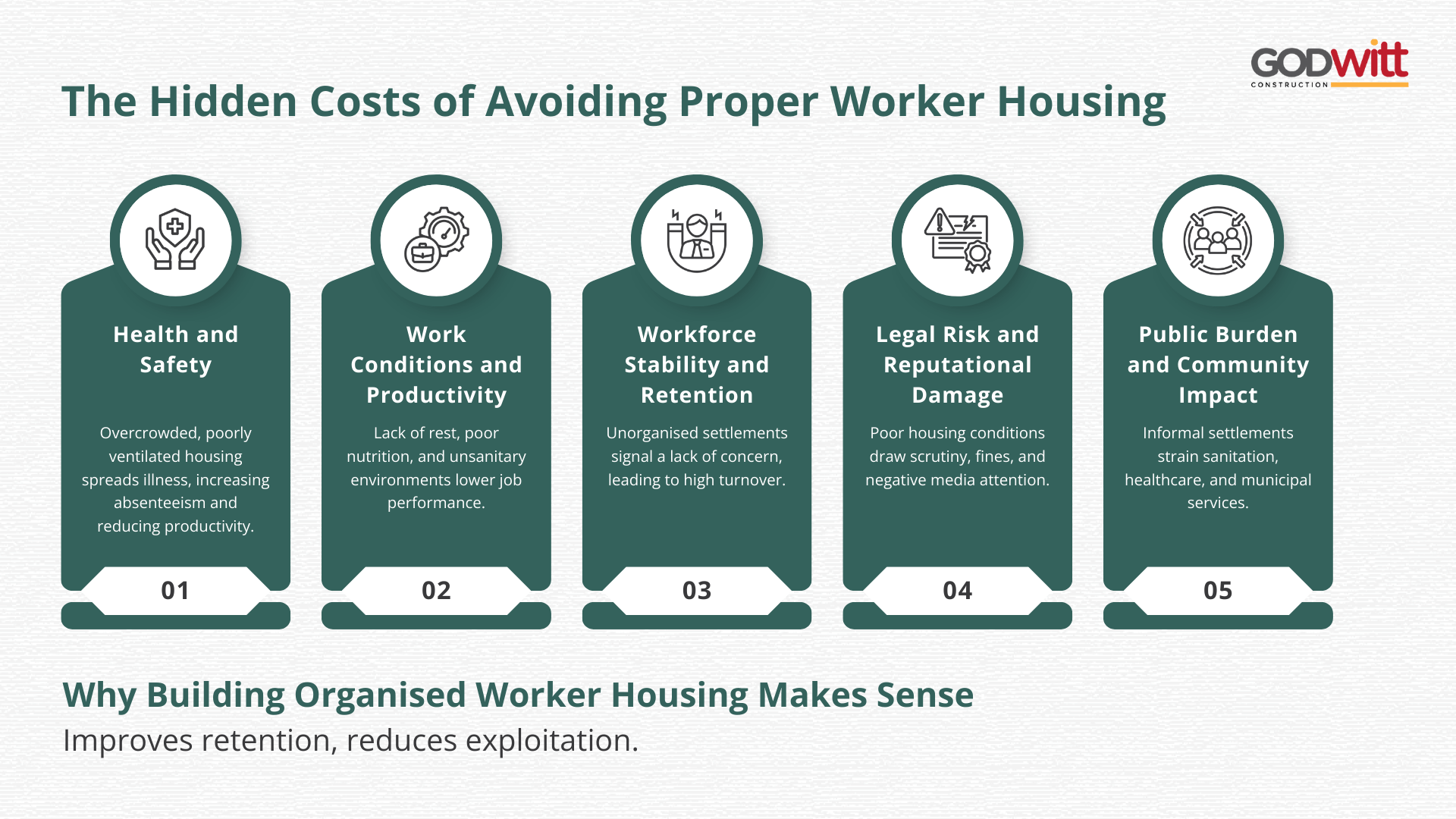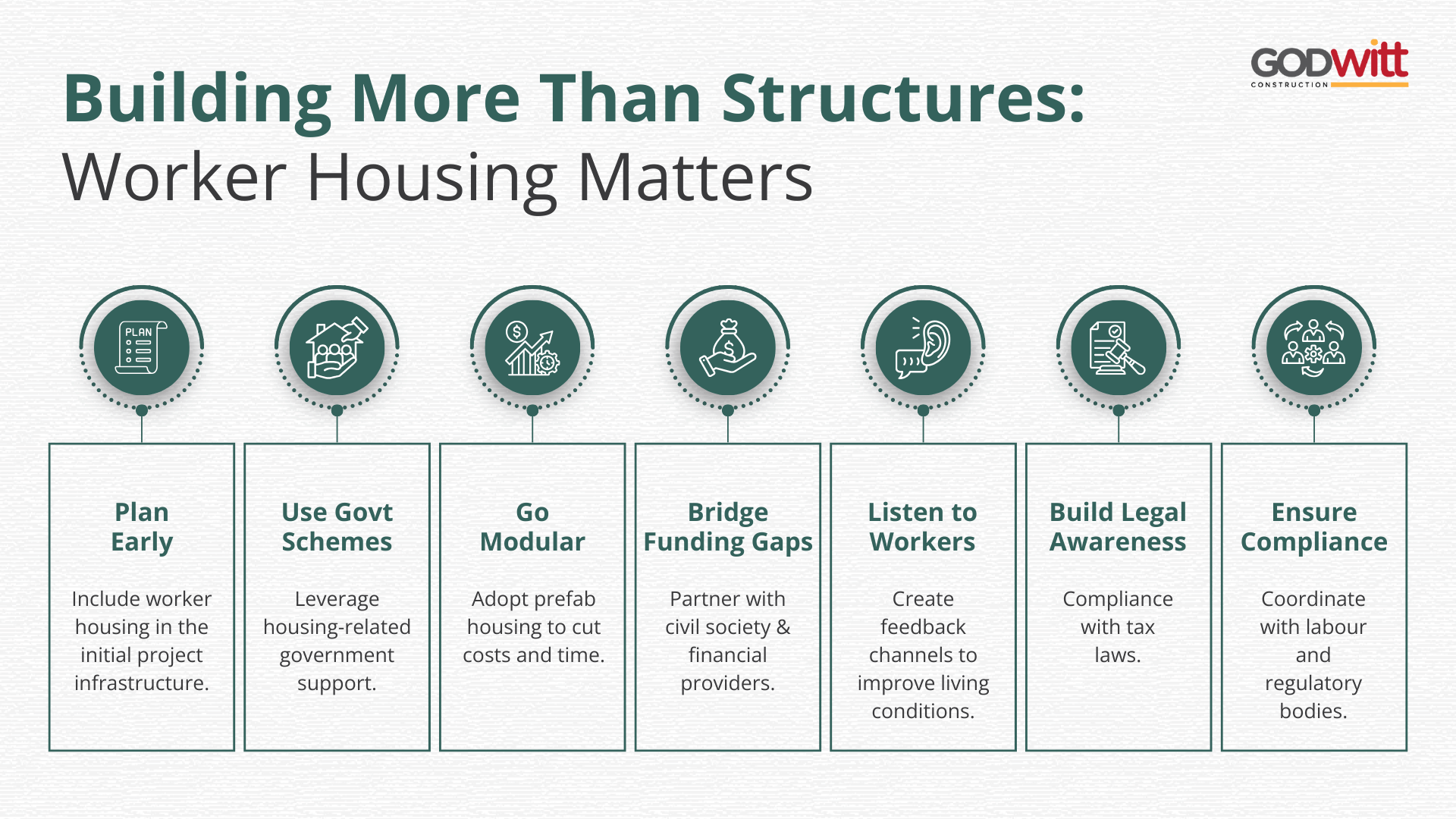The Real Cost of Ignoring Worker Housing in India’s Labour-Heavy Industries | 2025

Worker housing rarely makes headlines. It’s treated as an afterthought, even in sectors that rely heavily on human capital. However, the consequences of poor living conditions are not abstract. They affect businesses daily: reduced productivity, higher turnover, legal penalties, and reputational damage.
Here’s the reality. As of mid-2023, India continues to host over 41 million interstate migrant workers, with approximately 10.8% of them moving specifically for employment, primarily in sectors such as construction, manufacturing, and logistics.
That’s a massive workforce, most of whom don't have consistent access to safe, reliable, or affordable housing. The high invisibility of these informal workers continues to leave them vulnerable to exploitation, harassment, poor safety and health, and an overall inadequate working environment, especially when basic needs like housing are unmet.

What Do We Mean by Organised Worker Housing?
Organised worker housing refers to structured, planned accommodation for labourers/human capital that meets basic health, safety, and living standards. It is usually built or facilitated by the employer, local authorities, or third-party vendors. These organised spaces offer utilities, sanitation, and proximity to workplaces such as factory premises or construction sites, balancing both labour rights and business goals.
On the flip side, unorganised housing includes makeshift settlements, overcrowded rented rooms, or illegal encroachments. These are common in factories across the textile and agricultural sectors, as well as in logistics, mining, manufacturing, and construction. These are also the sectors where the unorganised sector workforce is often large, poorly protected, and vulnerable to unsafe housing and employment practices.
The Costs of Avoiding Proper Worker Housing
Health and Safety
Neglecting labour housing isn’t just unethical, it’s dangerous. Overcrowded, poorly ventilated housing fosters the spread of illness and is especially unsafe for women workers and children who may live in these conditions. When workers live in compromised environments, they fall ill more often, raising absenteeism and reducing workplace productivity. This, in turn, directly affects production costs and overall sector output.
Moreover, employers, especially those in sectors relying heavily on migrant and contract-based workers, can face regulatory action. In many cases, the responsibility doesn't end at the job site; companies are now accountable for ensuring worker welfare off-site as well, a view increasingly endorsed by the Indian government and international standards, including those of the International Labour Organisation (ILO).
Work Conditions and Productivity
Housing has a significant influence on workers’ daily lives. Lack of rest, poor nutrition, and unsanitary environments severely affect work conditions and job performance. Informal workers living in unrecognised colonies often struggle with long commutes, low earnings, and disrupted schedules, leading to reduced output and morale.
Workforce Stability and Retention
Unorganised settlements near workplaces signal to workers, particularly informal sector workers, that their welfare is not a priority. In sectors like garments and textiles, where frequent turnover is disruptive to operational efficiency, this instability translates into increased recruitment and training costs.
Experiences of sexual harassment, inadequate social security benefits, and random eviction from informal housing make many unorganised workers reluctant to continue at a given job site, particularly if they're engaged through contractors who evade formal employer responsibilities.
Creating organised housing under inclusive models allows enterprises and their trade unions to strengthen bargaining power and stabilise the workforce.
For home-based workers or self-employed workers who contribute significantly to the informal economy, access to proper housing is just as critical. Poor living environments blur the lines between productive and personal spaces, often diminishing output and overall well-being.
Legal Risk and Reputational Damage
Poor work conditions and exploitative housing arrangements attract scrutiny. Legal aid organisations and civil society bodies increasingly monitor employer practices, particularly regarding labour provisions around housing. Violations of the Social Security Act or concerns raised under the Ministry of Labour can bring reputational damage, financial penalties, and even suspension from participating in global supply chains.
High-profile incidents, such as worker deaths in unsafe and unorganised living quarters near factories, have received wide coverage in the media. These occurrences show not just a lack of enforcement of safety and health standards but also failings in basic human rights and labour protections.
Public Burden and Community Impact
When the private sector sidesteps responsibility for housing its large labour force, the burden shifts to municipal agencies already stretched thin. Informal settlements strain sanitation and healthcare systems, increase the risk of disease spread, and deepen the infrastructure gap in cities.
This isn’t just a labour issue, it’s a public health, moral, and governance issue. Harassment, poor access to water and medical facilities, and lack of residential security are everyday realities for many workers in the informal economy, especially those in the unorganised sector.
Why Building Organised Worker Housing Makes Sense
Yes, investing in organised housing involves upfront costs, but it creates long-term value for enterprises operating in worker-intensive sectors.
Housing improves workforce retention, boosts morale, reduces absenteeism, reduces exploitation, and lowers turnover. It also enhances a company’s compliance with laws related to labour rights and social security and strengthens its CSR and ESG credentials. In sectors reliant on informal workers and home-based workers, organised housing enables better health outcomes and raises productivity, factors which are crucial in a competitive labour market.
The benefits extend to access to labour in regions with otherwise high unemployment. Providing secure housing can serve as an incentive for attracting skilled migrant workers and contract labourers.
Some companies have already made progress through partnerships with local governments or by using modular housing systems. These structures are faster to install and often cheaper, especially for projects requiring temporary but quality living spaces, promoting a better working environment.
Despite schemes like the Affordable Rental Housing Complexes (ARHC) under the Ministry of Housing and Urban Affairs, the impact has been limited. Only 7% of ARHC units had been allocated to migrant labourers as of late 2024.
The policy intent is there, but without organisation and unified planning, implementation lags, highlighting a gap between promise and practice.
So What’s Standing in the Way?
The barriers aren’t always financial or logistical. Often, the resistance lies within the organisations themselves.
- Project teams exclude housing from initial budgets
- Legal and HR departments do not liaise effectively
- Lack of clarity on what qualifies as “adequate” housing
- Focus remains short-term, aimed at reducing immediate wage costs
- Social security measures around workplace housing enforcement are weak
- Implementation of existing mechanisms under the labour department is minimal
What Can Be Done?
Here are actionable steps industries can take:
- Plan from the start. Include housing in early project planning as core infrastructure
- Seek support under government schemes focused on organised housing
- Explore modular or prefabricated housing to reduce costs
- Engage civil society and financial services providers to bridge funding gaps
- Set up channels for worker feedback to monitor and improve living arrangements
- Promote legal literacy among workers about their rights and social security benefits
- Coordinate with the labour department and other agencies to ensure compliance

Use platforms like trade unions and worker organisations to gain insights from informal sector workers and offer negotiated wages, and basic entitlements like provident fund, pension, health insurance, and workers’ compensation.
Wrapping Up
Worker housing isn’t just a side issue; it’s at the heart of how businesses function. When workers live in safe, clean, and stable homes, they show up healthier, more focused, and more willing to stay. That’s good for the business and even better for them.
Ignoring this comes at a cost: lost productivity, higher turnover, health risks, and damage to your reputation.
If you're in construction, manufacturing, logistics, or any labour-heavy industry, it’s time to stop thinking of housing as someone else’s problem. Taking responsibility now is the smarter, more sustainable move for everyone involved.
For more insights, drop us an email!

Why to sign up for a newsletter
Open













